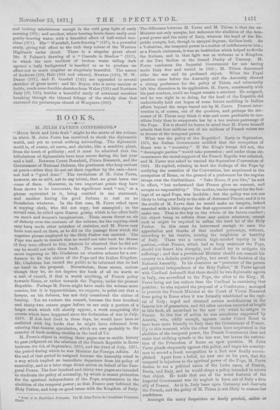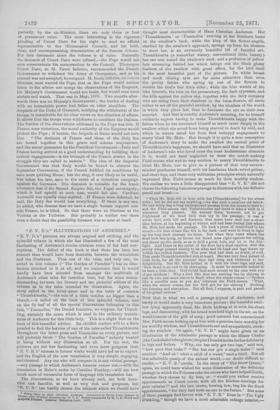BOOKS.
M. JULES FAVRE'S CONFESSIONS.*
4 4Mucts bruit and little fruit" might be the motto of the volume in which M. Jules Favre has contrived to shock the diplomatic world, and yet to reveal nothing astounding. The diplomatic world is, of course, all nerve, and shrinks, like a sensitive plant, from the touch of publicity ; and it must be admitted that the tribulations of diplomatists have been severe during the last year and a half. Between Count Benedetti, Prince Bismarck, and the .Government of National Defence, the gentlemen who keep nations at peace—when they do not set them together by the ears—have not had a "good time." The revelations of M. Jules Favre, however, are so mild, not to say trivial, that no great harm can 'come of them. Moreover, in two important points they have been shown to be inaccurate, the significant word " not," or a phrase equivalent to it, being omitted in one statement, and another having the good fortune to rest on no -foundation whatever. In the first case, M. Fevre relied upon a copying clerk, who did not copy, but miscopied ; in the 'second case, he relied upon Roman gossip, which is too often built on men's and women's imaginations. These errors throw an air of dubiety over the contents of the volume, for the copying-clerk may have made other mistakes of omission, and M. Favre may have reas oned on them, as he did on the passage from which the negative phrase employed by the Holy Father was omitted. The Pope was made to remark that he would not take back his States if they were offered to him, whereas he observed that he did not say he would not take them back. The second error is a state- ment imputing to Mr. Gladstone an abortive scheme for a con- ference to fix the status of the Pope and the Italian Kingdom. Mr. Gladstone has caused the public to be informed that he had no hand in the proposal. Nevertheless, these errors, serious 'though they be, do not deprive the book of all its worth as a sort of record, if that is worth anything, of French policy towards Rome, or rather towards the Papacy, under the present Republic. Perhaps M. Fevre might have made his volume more -concise, but it is hypercriticism, we suppose, to point out that a lawyer, on his defence, has not duly considered the claims of brevity. Yet we venture the remark, because the four hundred and thirty-two octavo pages before us are only a portion of a larger work which will shortly appear, a work comprising the events which have happened since the declaration of war in July, 1870: if Job had lived in these days, he would have been so surfeited with big books that he might have refrained from uttering that famous ejaculation, which we owe probably to the .scarcity of book-making sheikhs in the land of Uz.
M. Favre's object in writing these pages was to enable history to pass judgment on the relations of the French Republic to Rome between the 4th of September, 1870, and the 22nd of July, 1871, the period during which he was Minister for Foreign Affairs. At the end of that period he resigned because the Assembly voted in a way which implied an immediate departure from his policy of neutrality, and at a later stage direct action on behalf of the Tem- poral Power. The four hundred and thirty-two pages are intended to vindicate the policy of neutrality, by which is meant protection for the spiritual independence of the Pope, acquiescence in the abolition of the temporal power ; so that France may befriend the Holy Father, and keep on good terms with the Kingdom of Italy.
* Row el la RepuLlique Francaise. Par M. Juloa Favre do PAcaddraio Pranoalo. Varith
The difference between M. Fevre and M. Thiers is that the ex- Minister not only accepts, but welcomes the abolition of the tem- poral power and the unity of Italy, whereas the head of the Re- public accepts, but, though in unequal degrees, dislikes both. As a Voltairian, the temporal power is a matter of indifference to him ; as a French statesman, it was an institution which helped to divide the Italians, and in that light was as welcome as a Kingdom of the Two Siciliee or the Grand Duchy of Tuscany. M. Fevre condemns the Imperial Government for not having made Italy free and united in 1859; M. Thiers denounced alike the war and its professed object. When the Papal question came before the Assembly and the Assembly showed a strong preference for the policy of Thiers, and reluctantly left him discretion in its application, M. Favre, consistently with his past conduct, could no longer remain a minister. He resigned, and he was right in so doing, for the head of the Republic did undoubtedly hold out hopes of some future meddling in Italian affairs beyond the scope traced out by M. Favre. Present inter- vention is, of course, out of the question, and perhaps the suc- cessor of M. Thiers may think it wise and more profitable to con- ciliate Italy than to exasperate her by a too zealous patronage of the Pope. Yet it should be borne in mind that M. Favre himself admits that four millions out of six millions of French voters are in favour of the temporal power.
What was the policy of the Republic? Early in September, 1870, the Italian Government notified that the occupation of Rome was a "necessity." If the King's troops did not, the " demagogic parties" would take possession ; and under these cir- cumstances the moral support of the French Repulic was solicited, and M. Fevre was asked to rescind the September Convention of 1864. He replied, refusing to hurt the feelings of the Pope by notifying the cessation of the Convention, but acquiesced in the occupation of Rome, on the ground of a preference for the regular troops over the Garibaldians. "Take Rome, if you like," he said in effect, "but understand that France gives no consent, and accepts no responsibility." The motive, tender respect for the feel- ings of an aged Pope, was laudable ; but the policy was not one likely to bring over Italy to the side of distressed France, and it is to the credit of M. Favre that he would make no bargain, indeed resented with a little rigour the first appearance of an attempt to make one. That is the key to the whole of his future conduct ; his object being to refrain from any tuition whatever, exoept such as might be required to soften the hard lot of the Holy Father. In this sense he intervened enough to earn the approbation and thanks of that exalted personage, without, according to his version, rousing the suspicions or hostility of Italy. There was a certain high-minded loyalty in his position,—that France, which had so long sustained the Pope, should not desert him abruptly, and should try to mitigate his sufferings ; and that a provisional Minister should not commit his country to a definite positive policy, but await the decision of the National Assembly. In his character as "protector of the person and spiritual independence of the Holy Father," M. Fevre agreed with Cardinal Antonelli that there should be two diplomatic agents in Italy, one accredited to the Pope, the other to the King ; M. Favre being not less zealous than the Cardinal in sustaining that position ; he also rejected the proposal of a Conference ; managed to prevent the French Minister at the Court of Victor Emanuel from going to Rome when it was formally established as the capi- tal of Italy; urged and obtained certain modifications in the famous law of guarantees, and did other services recorded at length in this book, all accordant to the new role which he assigns to France, In this line of action he was sometimes supported by Austria, who, oddly enough, appears under Count Beust to have been more friendly to Italy than the Government of France. Up to this moment, while the other States have acquiesced in the abolition of the temporal power, the French Government does not resist that striking episode in the late war, but leaves the restora- tion of the Princedom of Rome an open question. M. Jules Favre pleads eloquently against this policy, and urges his country- men to accord a frank recognition to a fact now finally accom- plished. Apart from a belief, no new one on his part, that the temporal is injurious to the spiritual power of the Pope, M. Favre desires to see a political union of the Latin races, of France, Iberia, and Italy, and he would shape a policy intended to secure that object. Ho holds that one of the worst features of the Imperial Government was its neglect to form out of Italy a firm ally of France. As it is, Italy leans upon Germany and distrusts the French, and the policy of M. There is not likely to restore her confidence.
Amongst the many despatohes so freely printed, entire or
partially, by the ex-Minister, there are only three or four of permanent value. The most interesting is the vigorous pleading of Count Daru for the right to send an official representative to the CEcumenical Council, and his bold, clear, and uncompromising denunciation of the famous Schema. For this document alone the volume is of value. Naturally the demands of Count Darn were refused,—the Pope would not even communicate his memorandum to the Council. Thereupon Count Darn, so M. Favre believes, recommended the French Government to withdraw the Army of Occupation, and as his counsel was not accepted, he resigned. M. Emile 011ivier, ad interim Minister, not warned the Pope, that as the Pope would neither listen to the advice nor accept the observations of the Emperor, his Majesty's Government would not insist, bat would once more abstain and watch. That was in May, 1870. Two months after- wards there was no Majesty's Government ; the burden of dealing with an intractable power had fallen on other shoulders. The despatch of the Duke of Gramont, notifying the withdrawal of the troops, is remarkable for its clear views on the situation of affairs. It shows that the troops were withdrawn to conciliate the Italians. The burden of the observations addressed to the Pope was this. If France were victorious, the moral authority of the Emperor would protect the Pope ; if beaten, the brigade at Rome would not save hint. " The destinies of France and those of the Holy See are bound together in this grave and solemn conjuncture, and the surest guarantee for the Pontifical Government—Italy and France having arrived at a good understanding by fulfilling their mutual engagements—is the triumph of the French armies in the struggle they are called to sustain." The idea of the Imperial Government was that Italy would be bound to observe the September Convention, if the French fulfilled its conditions by once more quitting Rome; but the step, if ever likely to be useful, was taken too late, save in the event of a victorious campaign against the Germans. The despatch is valuable for the frank admission that if the Second Empire fell, the Papal sovereignty, which it had upheld at such cost, would fall also. Cardinal Autonelli was equally clear-sighted. If France were defeated, he said, the Holy See would lose everything. If there is any one, he added, who dreams that we have a single human support out- side France, he is blind. So that there were no illusions at the Vatican or the Tuileries. But probably in neither was there even a doubt that the possibility foreseen was so near at hand.



































 Previous page
Previous page